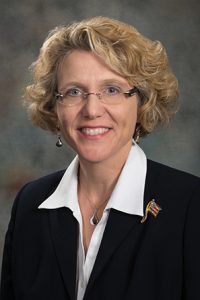Additional state aid from expanded sales, income taxes proposed
The Revenue Committee heard testimony March 1 on a bill that would use new sales and income tax revenue to provide more state aid to schools in an effort to reduce property taxes.
Bellevue Sen. Sue Crawford, sponsor of LB614, said the bill provides the Revenue Committee with “a menu of components” to choose from as it prepares its own tax reform proposal.
“Nebraska has a property tax problem,” she said. “LB614 is a responsible solution on the table that provides structural reform while protecting key services like health care, roads and K-12 schools.”
The bill would raise the excise tax on cigarettes from $0.64 cents per pack to $2.15 per pack and the tax on alcohol and spirits from $3.75 per gallon to $8.02 per gallon. LB614 also would impose sales and use tax on candy, soft drinks and bottled water.
In addition, the proposal would change several state income tax provisions. Nebraskans currently may subtract federal itemized deductions from their federal adjusted gross income for state income tax purposes. Under LB614, they could subtract only those deductions that are medical and dental expenses.
The bill would end an exclusion allowing owners of S corporations and limited liability companies to avoid paying Nebraska income tax on business income derived from sources outside the state. It also would end an income tax exclusion on the extraordinary dividends paid on and the capital gain from the sale or exchange of a corporation’s capital stock acquired through employment with that corporation.
Additionally, the bill would eliminate a tax exemption for the first $10,000 of valuation of tangible personal property.
The Legislative Fiscal Office estimates the changes would generate $297 million in fiscal year 2020-21.
LB614 would direct that additional revenue to school aid and would increase the state’s credit on the federal earned income tax credit from 10 percent to 15 percent.
The bill would distribute allocated income taxes to schools based on 20 percent of a local system’s income tax liability rather than the current 2.23 percent.
Beginning with school fiscal year 2018-19, it also would require the state Department of Education to reimburse each school district in the following fiscal year at least 80 percent of the total excess allowable costs for special education programs and support services provided by the district.
The department would determine supplemental state aid to be paid to each school district. The amount of aid would be a percentage of statewide average general fund operating expenditures and would be distributed proportionately to each local system.
Finally, the bill would require school boards to publish a budget summary before approving a budget for the upcoming fiscal year. The summary would include the percentage of the school’s budget that comes from federal, state and local sources and would be published at least three days prior to the budget hearing.
Renee Fry, executive director of OpenSky Policy Institute, testified in support of LB614. She said the proposed supplemental school aid and increase in allocated income taxes could allow school districts to reduce their property tax levies by 8 cents on average.
Fry said the proposed budget summary would be a better approach than placing a limit on school spending, as other bills introduced this session would do.
“This additional level of transparency would hold local officials accountable without treating all school districts with a one-size-fits-all approach,” she said.
Kari Loseke, president of the Blair Community Schools Board, also testified in support. She said the proposal could allow the district to reduce its levy from the current $1.05 statutory limit to $0.86, providing significant relief to the district’s property taxpayers.
“We believe expanding the income tax base, repealing some exemptions and increasing certain consumption taxes seems to be a sustainable way to immediately fund public education,” Loseke said.
Testifying in opposition to the bill was Ron Quinn, executive vice president of Tenaska, an Omaha-based energy company. He said LB614 would “severely penalize” Nebraska S corporations and LLCs that do business outside the state. The bill would make Nebraska less attractive to new businesses, Quinn said.
“The worst thing we can do is create an environment which is not a friendly place to do business,” he said.
Also testifying in opposition was Bruce Grewcock, chairman and CEO of Kiewit, an Omaha-based construction and engineering company. He said employees are required to sell any Kiewit stock back to the company when they leave their job or retire. Without the capital gains exclusion that LB614 would eliminate, Grewcock said, many employees would leave Nebraska before retiring to avoid paying taxes when they sell their stock.
“I know property taxes are a priority for the Unicameral—and rightly so—but the solution to reducing taxes should not drive businesses, people and investment out,” he said.
Brian Gilliland, general manager of a Lincoln-based Coca Cola distributor, testified in opposition to the bill on behalf of the Nebraska Beverage Association. He said LB614 does not define “soft drink,” making it unclear which products would be subject to sales and use tax.
“We do not believe our industry’s products should be singled out and declared to not be food,” Gilliland said.
The committee took no immediate action on the bill.

